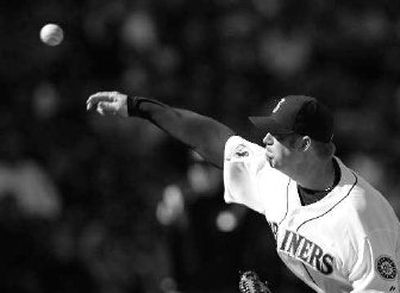Positively powerful

SEATTLE – In their idle moments before a game last year, several Seattle Mariners were clustered around the clubhouse TVs at Safeco Field, enamored with the 12-year-olds playing in the Little League World Series.
Relief pitcher J.J. Putz looked around and noticed outfielder Ichiro Suzuki was one of the few who wasn’t watching.
“Hey Ichiro,” Putz called out. “Why aren’t you watching? Japan is playing.”
“I don’t like to watch bad baseball,” Suzuki said.
Some might argue that Ichiro and his teammates have seen plenty of bad baseball the past three seasons, when the Mariners finished last each time.
Still, most agree that keeping negative images out of their minds is a positive thing.
“When you have those games when things don’t go right, those aren’t the ones you think about,” Putz said. “It’s the positive imagery that’s important. That’s what our mental skills coach is always saying.”
That’s right, the Mariners have a mental skills coach.
Dr. Jack Curtis is in his second season working with the Mariners and their minor league players. While other coaches work with the players on their hitting, fielding and throwing, Curtis deals with their minds.
Listen to him and it makes sense that a person can take a round bat, swing at a round ball and hit it square, as long as he maintains a positive image that he’ll do that.
“The subconscious mind is like a goal-seeking machine,” said Curtis, who has worked with business executives, Olympic athletes and, before the Mariners, the Milwaukee Brewers.. “If a person feeds negative input into a computer, the results will be negative because that’s what the computer is looking for. The mind works very similar to that.
“If I say ‘Don’t spill the milk,’ what do you see? But if I rephrase it and say, ‘Be careful with the milk,’ it’s a whole different image. Those images are things that affect us and affect our performance when they pop into our minds. Everything we do is based off our thinking process.”
Putz not only pictures positive images in his mind, he does his best to avoid negative ones on and off the field.
“If you imagine yourself giving up homer after homer after homer, what’s going to be in your head when you go out to the mound?” he asked. “When I’m watching the video of a home run pitch I threw, as soon as the pitch reaches the guy’s bat, I stop it and go to the next pitch. I don’t want that negative image in my head.”
That’s not easy in baseball, where the best hitters fail nearly 70 percent of the time and pitchers who throw gems often fret over those few mistakes they make during those games.
Curtis said research shows that the average person has negative thoughts 77 percent of the time.
“Baseball would probably take that to a larger extreme, maybe 80 to 85 percent because you are failing an awful lot in the game,” said Curtis. Mariners relief pitcher George Sherrill, for example, has a longstanding image of Oakland A’s slugger Eric Chavez in his mind, based on his own failure against Chavez.
“I picture the first at-bat he ever had off me,” Sherrill said. “It was a fastball up and away and he hit it out of the ballpark in Oakland. But instead of picturing that pitch, I try to put a positive spin on it and see myself getting him out over and over.”
That’s a process that Curtis calls “instant replay.” He says a player should replay the moment of failure in his mind, but think in terms of what should have happened.
“The mental part of the game is really a plan,” Curtis said. “A player should ask himself, ‘What can I do today that makes me better than I was yesterday?”